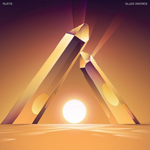|
|
 |
Dusted Reviews
Artist: Rustie Album: Glass Swords Label: Warp Review date: Oct. 11, 2011 |

|
|
|
 |
Rustie’s debut album Glass Swords contains some of the freshest, most exciting electronic dance music I’ve heard this year. Put simply, nothing sounds like this record.
The Night Slugs and Hessle Audio camps certainly craft singular, forward-looking tracks, but their productions, above all, make logical sense. Indeed, Rinse FM head Geeneus, in a recent interview with The Guardian, claimed that the aesthetes, rather than the streets, are defining today’s underground sound. Bok Bok tracks double as music criticism: there’s an obvious sense of music history being digested and recombined with whatever the hell he thinks is cool. I love this music more than the next person, but if I had a complaint, it’d be that the artists’ unimpeachable taste functions as bulletproof glass. Intuition and intellectualism seem to dissipate the danger of the grime and gangster rap influences.
Maybe the problem is simply that an obsession with the past (and DJs like Ben UFO and Oneman don’t hide their obsessions) has an uncomfortable place within ostensibly futuristic music. Rustie manages to sidestep the issue. Rather than synthesize sounds and scenes, on Glass Swords he simply piles idea on top of idea. He’s always had a unique sound, but he comfortably fit within genres. “Aqua crunk” or what-have-you simply described a particular spin on bass-heavy instrumental hip-hop. The sound could be tweaked by adding, say, synth arpeggios or a touch of Bmore shuffle, but the template was clear. After a relatively long absence, last year’s Sunburst EP revealed a new Rustie: less concerned with dancefloor conventions, more interested in songcraft, and willing to allow a disarming amount of space in his productions. Whereas he previously crafted ready-made club monoliths, on Sunburst he sporadically interrupted heavily interlocked melodies with off-kilter bass hits. I wasn’t sold on the approach, as it seemed self-indulgent and wasn’t nearly as instantly pleasurable as his earlier work.
Though I’m sure that much of Glass Swords was made concurrently, it feels like a full realization. In particular, the back half of the album just destroys. Nothing comfortably coalesces, at least not at first. Brief vocal samples immediately give way to wandering synth lines, beats suddenly disappear, huge sweeps indicate drops that never come. It took me several listens to figure out the surprisingly simple structure of album highlight “All Nite”; there are only a handful of segments, but their complexity obscures the song’s direction. The best tracks are so good that a relatively unusual track like “Surph" feels straightforward. All of its pieces fall in the expected places, but the mix is so unusual, the lead synth so front and center at the end, that even this track slightly upends expectations. This album is loud, obnoxious, personal, and a hell of a lot of fun.
It’s hard to describe Glass Swords without turning to phrases like “dizzying” and “information overload.” It certainly shares grime, dubstep, electro and hip-hop influences with other “future bass” artists, but its freewheeling, joy-of-assembling approach reminds me more of The Art of Noise. Rather than recontextualize the past, Rustie adheres to that group’s brand of purer futurism. The past? Though inescapable, we want nothing to do with it.
By Brad LaBonte
|







